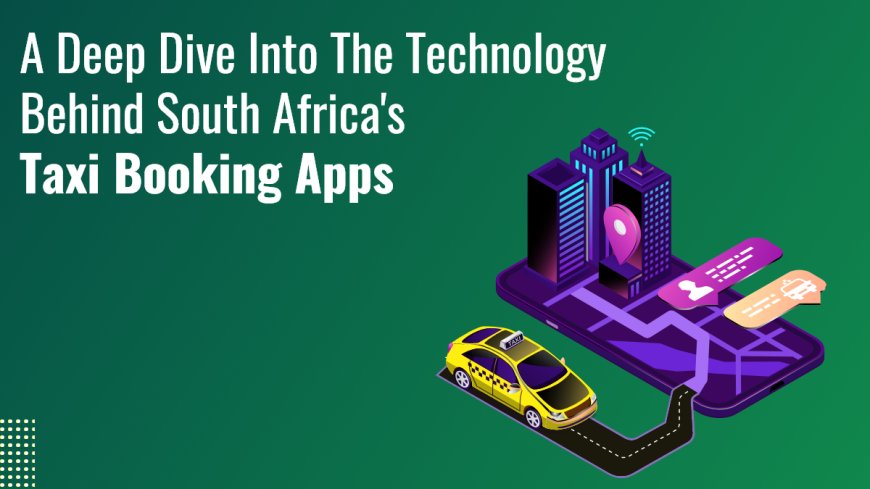A Deep Dive into the Technology Behind South Africa's Taxi Booking Apps
Uncover the technology powering South Africa's taxi booking apps, from GPS and real-time communication to AI and secure payment systems. This deep dive explores how these innovations are reshaping the transportation industry and enhancing commuter experiences.

In recent years, the transportation landscape in ride app South Africa has undergone a significant transformation, largely driven by the advent of taxi booking apps. These apps have revolutionized how people commute, offering convenience, safety, and efficiency in a country where traditional taxi services were often informal and unregulated. This article explores the technology that powers South Africa's taxi booking apps, examining the key components, innovations, and challenges that shape this evolving industry.
The Core Components of Taxi Booking Apps
Taxi booking apps, like those popular in South Africa, are complex systems that rely on a combination of technologies to provide seamless service. These core components work together to ensure that users can book rides, drivers can accept requests, and both parties can communicate and complete transactions securely.
1. GPS and Geolocation Services
At the heart of any taxi booking app is GPS and geolocation technology. These services allow the app to determine the user's location and the location of nearby drivers. By integrating with mapping services like Google Maps, the app can provide real-time tracking, route optimization, and estimated time of arrival (ETA). In South Africa, where the road network can be complex and traffic patterns unpredictable, accurate GPS services are crucial for the reliability of the app.
2. Real-Time Communication
Taxi booking apps require robust communication systems to facilitate real-time interactions between users, drivers, and the app's backend. This includes push notifications, in-app messaging, and telephony integration. For example, when a user books a ride, the app sends a push notification to the nearest available drivers. Once a driver accepts the ride, the app updates the user with the driver's details and arrival time. This instantaneous communication is made possible by integrating cloud-based messaging services and APIs.
3. Payment Gateways and Digital Wallets
Secure and convenient payment processing is another critical aspect of taxi booking apps. In South Africa, cashless transactions have gained popularity due to their convenience and security. Taxi apps integrate with payment gateways to allow users to pay via credit/debit cards, mobile money, or digital wallets. The app's backend ensures that these transactions are encrypted and processed securely, complying with financial regulations and protecting user data.
4. Driver and Vehicle Management
Managing a fleet of drivers and vehicles requires sophisticated backend systems. Taxi booking apps include features for driver registration, background checks, and vehicle verification. These systems are designed to ensure that only qualified drivers and roadworthy vehicles are available on the platform. In South Africa, where safety concerns are paramount, these features help build trust between the service provider and its users.
5. User Interface and Experience (UI/UX)
A user-friendly interface is essential for the success of any taxi booking app. The app's design must cater to a diverse user base, including individuals with varying levels of digital literacy. In South Africa, where the population is multicultural and multilingual, localization features such as language options and culturally relevant designs play a significant role in user adoption. A well-designed app provides an intuitive experience, guiding users through the process of booking a ride, tracking their driver, and completing the journey.
Innovations Driving the Future of Taxi Booking in South Africa
The taxi booking industry in South Africa is evolving rapidly, driven by technological innovations that aim to enhance service delivery, safety, and convenience.
1. Artificial Intelligence (AI) and Machine Learning
AI and machine learning are increasingly being integrated into taxi booking apps to optimize operations. These technologies can predict demand patterns, optimize pricing strategies, and suggest the best routes for drivers. In South Africa, where traffic congestion and peak-hour demand are significant challenges, AI-driven features can improve efficiency and reduce waiting times for users.
2. Ride-Sharing and Carpooling Services
To address the challenges of urban congestion and environmental sustainability, many taxi booking apps are introducing ride-sharing and carpooling options. These services allow multiple users to share a ride, reducing the number of vehicles on the road and lowering costs for passengers. In densely populated South African cities, this innovation could play a crucial role in reducing traffic and pollution.
3. Electric and Autonomous Vehicles
As the global automotive industry shifts towards electric and autonomous vehicles, South African taxi booking apps are beginning to explore these options. Electric vehicles (EVs) offer an environmentally friendly alternative to traditional petrol and diesel vehicles, while autonomous vehicles promise to revolutionize the future of transportation. Although still in the experimental phase, these technologies could significantly impact the South African taxi industry in the coming years.
Challenges and Opportunities
While the technology behind South Africa's taxi booking apps is advanced, the industry still faces several challenges. Connectivity issues in rural areas, the high cost of mobile data, and regulatory hurdles are some of the obstacles that app developers must navigate. However, these challenges also present opportunities for innovation. For example, developing apps that work efficiently in low-bandwidth environments could expand access to taxi booking services in underserved regions.
Conclusion
The technology driving South Africa taxi app is a blend of GPS, real-time communication, secure payment systems, and AI-driven innovations. These components work together to provide a reliable and convenient service that meets the needs of a diverse user base. As the industry continues to evolve, innovations such as ride-sharing, electric vehicles, and AI will shape the future of urban transportation in South Africa. Despite the challenges, the potential for growth and positive impact on society is immense, making it an exciting time for the taxi booking industry in the region.

 smithjoe
smithjoe 










